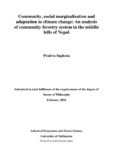Please use this identifier to cite or link to this item:
http://archive.nnl.gov.np:8080/handle/123456789/217| Title: | Community, social marginalisation and adaptation to climate change: An analysis of community forestry system in the middle hills of Nepal |
| Authors: | Sapkota, Prativa |
| Keywords: | Climate change |
| Issue Date: | 27-Mar-2019 |
| Abstract: | Climate change has become a key challenge to sustainable development in the Nepal Himalayas, a region with some of the world’s poorest and most climate vulnerable communities. Adaptation to climate change is therefore an urgent task and there has been an upsurge in research and policy responses to enhance adaptive capacity of local communities. This includes community-based and ecosystem-based approaches to adaptation. Although the forests constitute an integral part of the livelihood system in Nepal and in the developing world generally, their role in supporting adaptive capacity has often been neglected in both scholarly research and policy. The interactions among institutions, marginalized groups and forests are also poorly recognized in contemporary adaptation studies. This study analyses the link between forests and people, taking the case of the community forestry system (CFS) in the Middle Hills of Nepal. In combining a social-ecological system perspective with the concepts of vulnerability and resilience, this study investigates the prospects for community forestry enhancing the adaptive capacity of marginalized groups. The |
| URI: | http://103.69.125.248:8080/xmlui/handle/123456789/217 |
| Appears in Collections: | 300 Social sciences |
Files in This Item:
| File | Description | Size | Format | |
|---|---|---|---|---|
| PrativaSapkota_PhD_Thesis_2016.pdf | 4.79 MB | Adobe PDF |  View/Open |
Items in DSpace are protected by copyright, with all rights reserved, unless otherwise indicated.